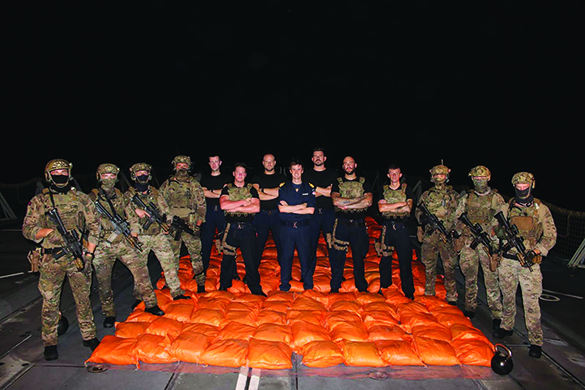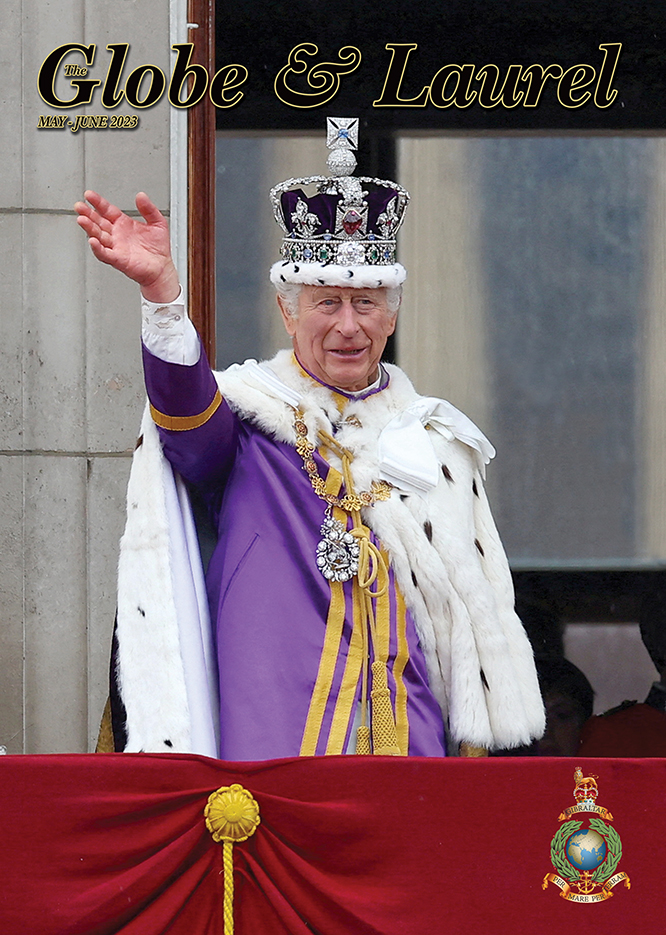The following article is taken from the latest issue of the Globe & Laurel magazine.
Click the button below to discover more.

by Capt J Lavender, OC RMBT
A Royal Marines Boarding Team (RMBT) from L Coy, deployed with HMS Lancaster earlier this year as part of Op Kipion. The RMBT’s primary role is providing the boarding capability when the ship is conducting counter narcotics and weapons interdiction operations in the region in support of a multi-national effort, known as Maritime Interdiction Operations (MIOPs). However, whilst deployed, the team quickly found themselves re-roled to support emerging tasks in east Africa at very short notice, highlighting the unique flexibility of RMBTs for contingent operations.

As Sudan tragically slid into civil conflict, HMS Lancaster steamed towards Port Sudan. Within days of sailing both Lancaster and her RMBT were utilised to support Op Polarbear, the UK mission to evacuate UK nationals and other Eligible Persons (EPs) from Sudan as the situation deteriorated. When the orders reached the ship, it became clear the RMBTs would be asked to assist with the EP loading process onto HMS Lancaster, protect the vessel if conflict was to breakout within the confines of Port Sudan while loading EPs and finally act as a quick reaction force (QRF) to UK and partner force elements already on the ground.
However, when the ship arrived into port and the ops team had a greater understanding of the situation, it was not long before the RMBT was re-roled ashore to support the UK Joint Force Operational Liaison and Reconnaissance Team (ORLT) that had been augmented by CO 42 Cdo’s Tac HQ. In what was a high-pressure and high-tempo environment, our responsibilities were wide-ranging and dynamic, requiring flexibility, resilience and compassion from the team. Initially, this included assisting in all facets of processing EPs as they arrived at the port and working alongside US consulate staff in their efforts to speed up the processing of US personnel, all whilst providing a security wrap for the combined UK MOD-FCDO team.
The RMBT was then ordered to support reconnaissance operations on key evacuation routes for EPs to reach the extraction points now already established by the UK team. The initial phase culminated when the EPs started to be evacuated by road to the various maritime and air extraction points, which required the team to lead the routes and provide Force Protection and communication support to the convoys, vital to navigating congested roads littered with hazards and armed checkpoints.
The final phase of Op Polarbear was once again enabled by the RMBT. As the last of the MOD and FCDO command elements withdrew to HMS Lancaster, due to the deteriorating situation in Port Sudan, the team recce’d extraction points and provided Force Protection. The RMBT and crew of HMS Lancaster, who had provided humanitarian aid to EPs and operational support to the ORLT throughout, felt it was an extremely successful operation which highlighted the flexibility and utility of RMBTs able to deliver offset effect from the ship.
If ever there was more evidence needed of how quickly a RMBT can re-orientate, immediately following Op Polarbear the team and HMS Lancaster were ready to get back to their primary role, and within 48 hours of leaving Port Sudan, we conducted HMS Lancaster’s first night boarding for some time, successfully seizing 3460kg of hashish. On completion, the ship continued back into its primary area of operations ahead of a port stop to allow the UK MOD-FCDO Op Polarbear team to return to the UK. This was all within the space of one week.
After a brief but much needed reset in Dubai, the ship and RMBT were back in action, executing another three successful boardings, two of which took place in one day. The first of these started at sunrise in sea state 4 (fairly challenging for our coxswains) with a second later that day. These resulted in a combined seizure of nearly 7.5 tons of hashish, 50kg of heroin and 142kg of crystal meth.
So far, this has been a very successful deployment for HMS Lancaster and her RMBT. The team have had to adapt for maritime interdictions, Force Protection, QRF, recce, vehicle convoys and non-combatant evacuation operations, in varying profiles. The RMBT’s performance in such a short period of time proves that the Royal Marines remain ready to execute contingency operations to a high standard at short notice wherever we are deployed.
Read more from the Journal of the Royal Marines
For more information, and to read similar stories, visit: Globe & Laurel – RMA – The Royal Marines Charity (rma-trmc.org)
